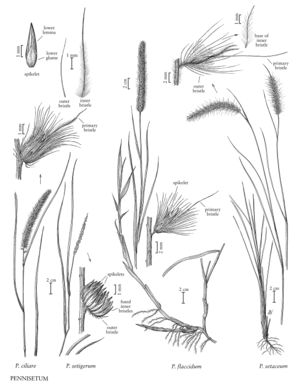Difference between revisions of "Pennisetum setaceum"
FNA>Volume Importer |
FNA>Volume Importer |
||
| Line 20: | Line 20: | ||
-->{{Treatment/Body | -->{{Treatment/Body | ||
|distribution=Colo.;N.Mex.;La.;Calif.;Tenn.;Pacific Islands (Hawaii);Ky.;Ariz.;Fla.;Oreg. | |distribution=Colo.;N.Mex.;La.;Calif.;Tenn.;Pacific Islands (Hawaii);Ky.;Ariz.;Fla.;Oreg. | ||
| − | |discussion=<p | + | |discussion=<p>Pennisetum setaceum is a desert grass native to the eastern Mediterranean region. It is a popular ornamental throughout the southern United States, but it is also an invasive weed.</p> |
|tables= | |tables= | ||
|references= | |references= | ||
| Line 36: | Line 36: | ||
|basionyms= | |basionyms= | ||
|family=Poaceae | |family=Poaceae | ||
| + | |illustrator=Linda A. Vorobik | ||
|distribution=Colo.;N.Mex.;La.;Calif.;Tenn.;Pacific Islands (Hawaii);Ky.;Ariz.;Fla.;Oreg. | |distribution=Colo.;N.Mex.;La.;Calif.;Tenn.;Pacific Islands (Hawaii);Ky.;Ariz.;Fla.;Oreg. | ||
|reference=None | |reference=None | ||
| Line 41: | Line 42: | ||
|publication year= | |publication year= | ||
|special status= | |special status= | ||
| − | |source xml=https:// | + | |source xml=https://bibilujan@bitbucket.org/aafc-mbb/fna-data-curation.git/src/314eb390f968962f596ae85f506b4b3db8683b1b/coarse_grained_fna_xml/V25/V25_1366.xml |
|subfamily=Poaceae subfam. Panicoideae | |subfamily=Poaceae subfam. Panicoideae | ||
|tribe=Poaceae tribe Paniceae | |tribe=Poaceae tribe Paniceae | ||
Revision as of 16:15, 30 October 2019
Plants perennial, or annual in temperate climates; cespitose. Culms 40-150 cm, erect, pubescent beneath the panicle; nodes glabrous. Leaves green, sometimes glaucous; sheaths glabrous, margins ciliate; ligules 0.5-1.1 mm; blades 20-65 cm long, 2-3.5 mm wide, convolute or folded, scabrous, midvein noticeably thickened. Panicles (6)8-32 cm long, 40-52 mm wide, erect or arching, pink to dark burgundy; rachises pubescent. Fascicles 8-10 per cm; fascicle axes 2.3-4.5 mm, with 1-4 spikelets; outer bristles 28-65, 0.9-19 mm; inner bristles 8-16, 8-27 mm, ciliate; primary bristles 26.5-34.3 mm, ciliate, noticeably longer than the other bristles. Spikelets 4.5-7 mm, sessile or pedicellate; pedicels to 0.1 mm; lower glumes absent or to 0.3 mm, veinless; upper glumes 1.2-3.6 mm, (0)1-veined; lower florets usually sterile, sometimes staminate; lower lemmas 4-6 mm, 3-veined, acuminate, midvein excurrent to 0.7 mm; lower paleas usually absent, if present, to 4.4 mm; anthers absent or 2.3-2.4 mm; upper lemmas 4.5-6.7 mm, attenuate, 5-veined, midvein excurrent to 0.7 mm, margins glabrous; anthers 2.1-2.7 mm. 2n = 27.
Distribution
Colo., N.Mex., La., Calif., Tenn., Pacific Islands (Hawaii), Ky., Ariz., Fla., Oreg.
Discussion
Pennisetum setaceum is a desert grass native to the eastern Mediterranean region. It is a popular ornamental throughout the southern United States, but it is also an invasive weed.
Selected References
None.
